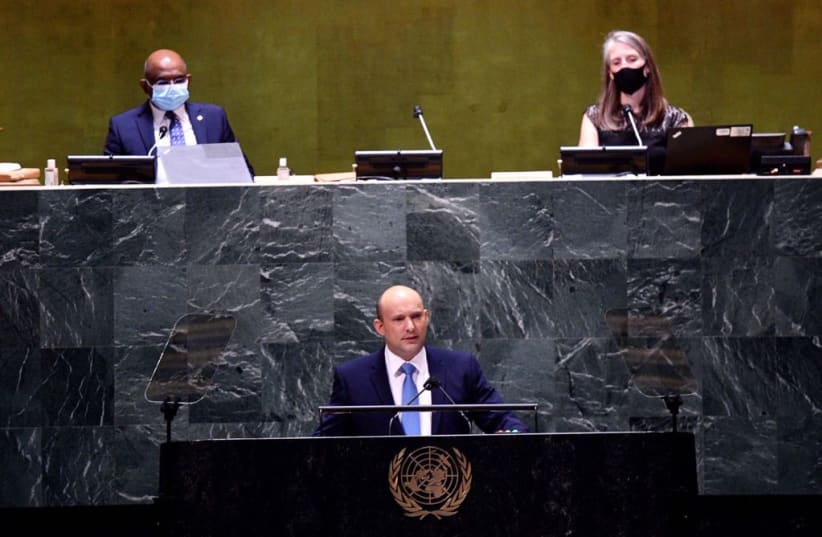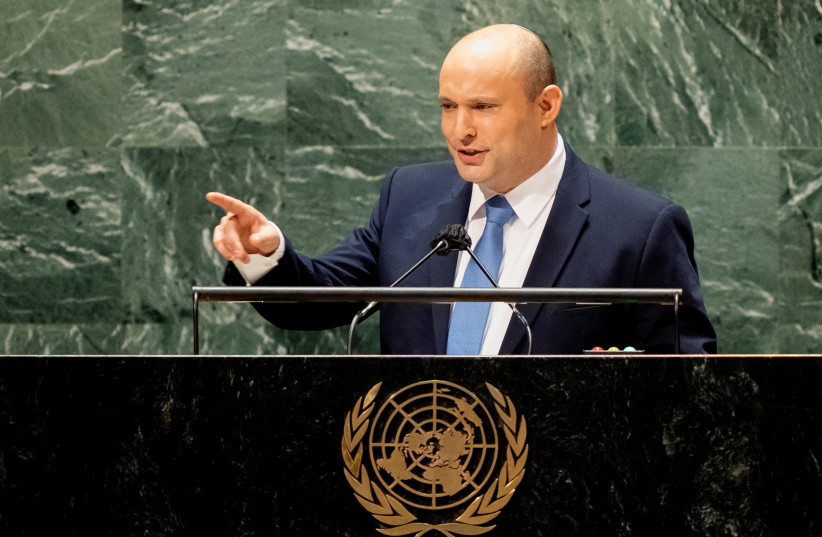Somewhere on the way to delivering his speech on Monday to the United Nations General Assembly, Prime Minister Naftali Bennett got his audience mixed up.
Although Bennett went to speak on the premier international stage to an audience that, at least in theory, included leaders from every country in the world, the speech he delivered seemed meant primarily for the few Israelis who tuned in and watched just a few hours before the start of the Shmini Atzeret/Simhat Torah holiday.
There was our prime minister speaking to the world, but instead of even mentioning in passing the issue regarding Israel that – whether he likes it or not – much of the world is concerned about, the Palestinians, he honed in on the coronavirus and emphasized what a great thing it was that he built a diverse coalition.
Both those issues – the coalition and his dealing with corona – are of interest primarily to a domestic audience, not an international one. One can argue that the coronavirus is an international issue, but here Bennett did not break any new ground. Rather, he tried again to convince his electorate that he is doing a bang-up job managing the crisis.
In the process of patting Israel on the back for its corona policies, Bennett took an entirely gratuitous jab at the Health Ministry professionals and experts advising him on the pandemic.
“Running a country during a pandemic is not only about health,” he said in a thinly veiled attack on those, like Sharon Alroy-Preis, head of the ministry’s Public Health Services, who have been pushing for more restrictive measures to deal with the newest COVID-19 wave. “It’s about carefully balancing all aspects of life that are affected by corona, especially jobs and education.
“While doctors are an important input, they cannot be the ones running the national initiative,” he continued. “The only person that has a good vantage point of all of this is the national leader of any given country.”
While this may be true, Bennett did not have to travel halfway around the world on the eve of a holiday to deliver that message. If he wanted to take the ministry professionals to task – as he did in that speech and even more so in a briefing with reporters afterward – he could have stayed home to do it.
In fact, he should have stayed home to do it. One waning aspect of American political culture that Israeli politicians and leaders would do well to adopt is that criticism stops at the water’s edge.
If politicians want to criticize the government or the state, even bash it, they have plenty of opportunities to do so from the Knesset rostrum or one of the country’s television studios. There is no reason to go abroad to do it. This is as true when criticizing Israel’s foreign policy as it is when slamming Health Ministry officials. Do it at home; don’t travel abroad to do it in front of an international audience.
The reason is simple: the world is not interested; nor does it need to be informed of the inner workings between the prime minister and the professional health echelon. Why air this type of dirty laundry in public? What good does it do? There are enough people out there interested in making Israel look bad, without Bennett bad-mouthing those working in his own government’s bureaucracy.
Regarding making Israel look bad, Bennett might have helped Israel’s cause by addressing the Palestinian issue, even if only briefly, and even if only to say that Israel remains interested in solving the conflict, as it always has been.
It is no secret that Bennett is no advocate of the two-state solution, and he doesn’t need to say he is. But what Israeli leaders need to do in these types of venues is extend a hand to the Palestinians, show an interest in wanting to improve the situation, even if conditions for solving the conflict are not ripe.
Israel is neither the rejectionist nor the recalcitrant party in this saga, nor should it appear as such. But by not even mentioning the issue, or articulating a yearning to solve the conflict, Bennett provided ammunition to those around the world – including the Palestinians – eager to cast Israel precisely in that unfavorable light.

